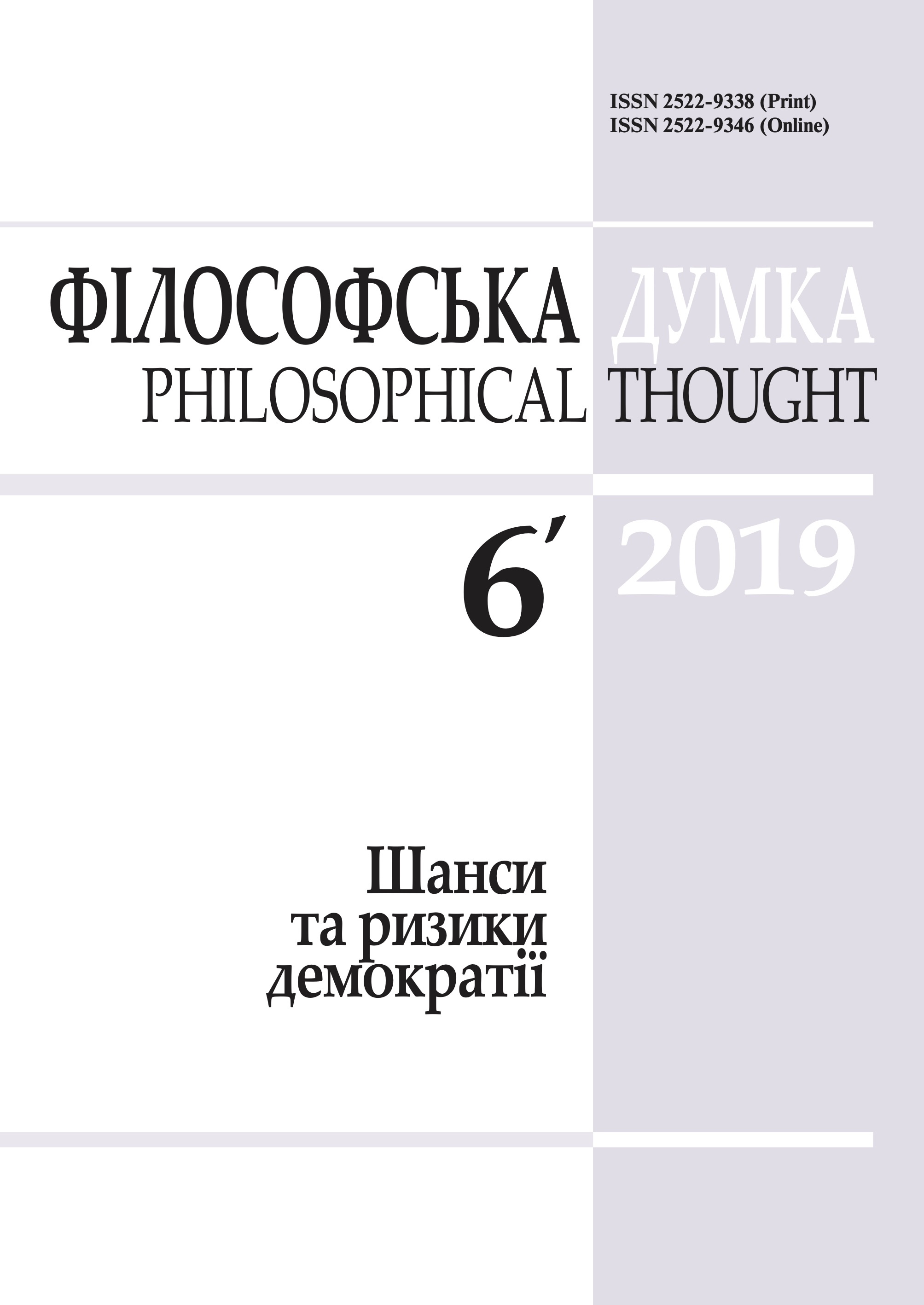Hasidism in the early works of Martin Buber: Ostjuden or “light from the Orient”?
HISTORY OF PHILOSOPHY
DOI:
https://doi.org/10.15407/fd2019.06.081Keywords:
Hasidism, Orientalism, M. Buber, Haskalah, OstjudenAbstract
The article analyses mystical teaching of Hasidism in the early works of Martin Buber (before publication of “I and Thou” in 1923) in the context of the concept of Orientalism by E. Said. Analysis is based on the M. Buber’s appeal to Hasidic sources in the 1900s-1910s (in particular, in his first two collections, “Rabbi Nachman of Bratslav” and “The Legend of Baal Shem”). Two factors allow examining Hasidism in the early Buber’s writings in the context of Orientalism: a growing interest in the Orient in the circles of European Jewish intellectuals during late 19th cent, as well as the negative stereotype of traditional East European Jew (Ostjuden, “an Eastern Jews”) present in the modernized Jewish society. The article demonstrates that this stereotype is closely related to the criticism of Hasidism by representatives of the Jewish Enlightenment (Haskalah). In particular, the accusations of traditional Eastern European Jews of inclination to vanity and prejudice, as well as of subjugation to the infinite power of the miracle workers (tzadikim), clearly have a source in maskilic criticism of Hasidism.
The Buber’s turn towards Hasidism took place in mid-1900s. It was connected with Buber’s interest in Oriental mysticism, and with his social activities as “cultural Zionist”. Overcoming the “Ostjude” stereotype turned out to be an essential part of Buber’s cultural program. Buber reconstructs Jewish mysticism as an integral phenomenon, the subject of academic study. According to Buber, the most striking manifestation of this phenomenon is the Eastern-Euro pean mystical movement of Hasidism. It is from Ostjuden that the source of Hasidic wisdom is linked, which in the essays of the cycle of “Judaism” is a true “light from the East.”
References
Buber, M. (2012). I and Thou. The Way Of Man: According to the Teaching of Hasidism. [In Ukrainian] Kyiv: Duh i Litera.
Fransoz, K.E. (2010). Ucrainica. Culturological Essays. [In Ukrainian] Chernivtsi: Knyhy-XXI.
Buber, M. (1995). Two Types of Faith. [In Russian] Moscow: Respublika.
Buber, M. (2008). The Way Of Man: According to the Teaching of Hasidism. [In Russian] In: M. Buber, Tales of the Hasidim: The Early Masters (pp. 357-372). [In Russian] Moscow: Mosty Kultury; Jerusalem: Makhanaim.
Buber, M. (2008). Tales of the Hasidim: The Early Masters. [In Russian] Moscow: Mosty Kultury; Jerusalem: Makhanaim.
Buber, M. (2009). Tales of the Hasidim: The Later Masters. [In Russian] Moscow: Mosty Kultury; Jerusalem: Makhanaim.
Buber, M. (1997) Tales of the Hasidim. [In Russian] Moscow: Respublica.
Said, E.W. (2006). Orientalism: Western Conceptions of the Orient. [In Russian] S.l.: Russkii Mir.
Sokuler, Z. (2008). Hermann Cohen and the Philosophy of Dialogue. [In Russian] Moscow: Progress-Traditsia.
Buber, M. (1918). Mein Weg zum Chassidismus. Frankfurt am Main: Rutten and Loening.
Buber, M. (1920). Drei Reden ber das Judentum. Frankfurt am Main: Rutten and Loening.
Buber, M. (1920). Die Geschichten des Rabbi Nachman. Leipzig: Oskar Brandstetter.
Buber, M. (1048). Hasidism. New York: Philosophical Library.
Buber, M. (1956). The Tales of Rabbi Nachman (transl. by M. Friedman). New York: Indiana University Press.
Buber, M. (1958). Hasidism and Modern Man. New York: Horizon Press.
Buber, M. (1958). My way to Hasidism. In: M. Buber, Hasidism and Modern Man (pp. 45-70). New York: Horizon Press.
Buber, M. (1960). The Way of Man According To The Teachings of Hasidism. Wallingfort: Pendle Hill Publications.
Buber, M. (1984). Ekstatische Konfessionen. Gesammelt. Heidelberg: Lambert Schneider.
Buber, M. (1996). The Spirit of the Orient and Judaism. In: M. Buber, On Judaism. (рр. 56-77). New York: Schocken Books.
Buber, M. (2002). The Legend of Baal-Shem. Translated from the German by M. Friedman. London, New York: Routledge.
Buber, M. (2002). The Life of the Hasidim. In: M. Buber, The Legend of Baal-Shem. Translated from the German by M. Friedman (pp. 3-37). London, New York: Routledge.
Ecstatic Confessions. The Heart of Mysticism. Collected by Martin Buber (1996) (ed. by P. Mendes-Flohr, trasl. by E. Cameron). S.l.: Syracuse University Press.
Efron, J. (2004). From Mitteleuropa to the Middle East: Orientalism through a Jewish Lens. The Jewish Quarterly Review, 94 (3), 490-520.
https://doi.org/10.1353/jqr.2004.0013
Friedman, M. (1956). Martin Buber. The Life of Dialogue. Chicago: The University of Chicago Press.
Friedman, M. (1991). Encounter on the Narrow Ridge: A Life of Martin Buber. New York: Paragon House.
Graetz, H. (1956). History of the Jews (Vol. 5). Philadelphia: The Jewish Publication Society of America.
Hollander, D. (2006). Buber, Cohen, Rosenzweig and the Politics of Cultural Affirmation. Jewish Studies Quarterly, 13, 87-103.
https://doi.org/10.1628/094457006776207349
Huss, B. (s.a.). Martin Buber's Introduction to The Tales of Rabbi Nachman and the Early 20th Century Construction of 'Jewish Mysticism. Retrieved from: http://hsf.bgu.ac.il/cjt/files/electures/Buber2.htm
Mendes-Flohr, P. (1991). Divided passions: Jewish intellectuals and the experience of Modernity. Detroit: Wayne State University Press.
Orientalism and the Jews (2005). Waltham: Brandeis University Press.
Rotenstreich, N. (2009). Immediacy and Its Limits. A Study in Martin Buber's Thought (2009). S.l.: Harwood Academic Publishers.
Urban, M. (2008). Aestetics of Renewal. Martin Buber's Early Representation of Hasidism as Kulturkritik. Chicago, London: University of Chicago Press.
https://doi.org/10.7208/chicago/9780226842738.001.0001
Wertheimer, J. (1987). Unwelcome strangers. East European Jews in Imperial Germany. New York: Oxford University Press.
Downloads
-
PDF (Українська)
Downloads: 507
Published
How to Cite
Issue
Section
License
Authors who publish with this journal agree to the following terms:
- Authors retain copyright and grant the journal right of first publication.
- Authors are able to enter into separate, additional contractual arrangements for the non-exclusive distribution of the journal's published version of the work (e.g., post it to an institutional repository or publish it in a book), with an acknowledgement of its initial publication in this journal.
- Authors are permitted and encouraged to post their work online (e.g., in institutional repositories or on their website) prior to and during the submission process, as it can lead to productive exchanges, as well as earlier and greater citation of published work (See The Effect of Open Access).


